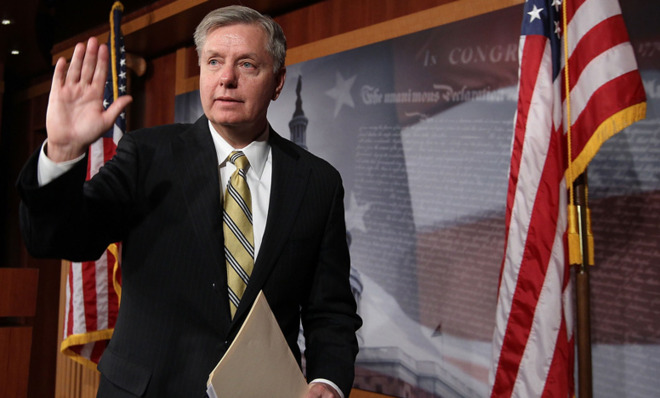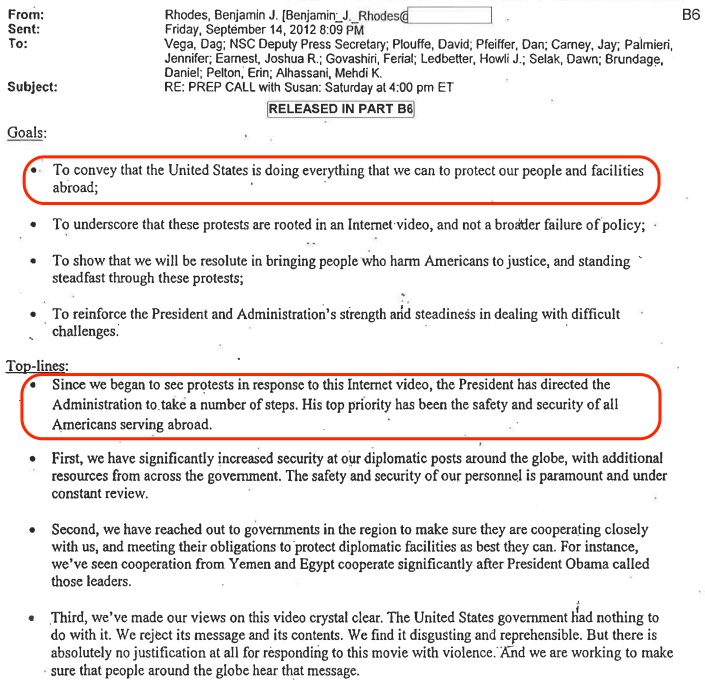What do Republicans want to prove with Benghazi?
A newly released email has added fuel to the Benghazi-gate conflagration. But where does this end?


A free daily email with the biggest news stories of the day – and the best features from TheWeek.com
You are now subscribed
Your newsletter sign-up was successful
Earlier this week, the White House released some documents relating to its response to the Sept. 11, 2012, attack on the U.S. diplomatic outpost in Benghazi, Libya. It was compelled to do so by a Freedom of Information Act request from the conservative watchdog group Judicial Watch. Sen. Lindsey Graham (R-S.C.) called one of the documents — an email from Deputy National Security Adviser Ben Rhodes — the "smoking gun" Republicans have long sought.
But smoking guns are evidence of a crime. What crime did the Obama administration commit, legally speaking or otherwise? Rhodes' Sept. 14, 2012, email has the subject line "RE: PREP CALL with Susan," regarding a scheduled appearance by Susan Rice, then U.S. ambassador to the United Nations, on Sunday talk shows three days later. Here are the talking points that have Republicans excited:

As Slate's David Weigel notes, based on emails released a year ago, the CIA originated a set of talking points six hours before Rhodes' email saying that "the attacks in Benghazi were spontaneously inspired by the protests at the U.S. Embassy in Cairo." In Cairo, hours before the Benghazi terrorist attack, protesters had scaled the walls of the U.S. Embassy and replaced the U.S. flag with a black one used by Islamist militants — in response to a YouTube video, Innocence of Muslims. Similar protests broke out elsewhere in the Muslim world.
The Week
Escape your echo chamber. Get the facts behind the news, plus analysis from multiple perspectives.

Sign up for The Week's Free Newsletters
From our morning news briefing to a weekly Good News Newsletter, get the best of The Week delivered directly to your inbox.
From our morning news briefing to a weekly Good News Newsletter, get the best of The Week delivered directly to your inbox.
Rice, in her Sunday appearances, said that the "best assessment" of the U.S. intelligence community and the White House was that the Benghazi attack started out as "spontaneous — not a premeditated — response to what had transpired in Cairo," before being hijacked by "extremist elements." She focused on the video, and didn't call the attackers who killed U.S. Ambassador Chris Stevens and three U.S. security personnel terrorists.
"That's the scandal," says Weigel, "that by giving the video all this credit, the administration was distracting people from the real story that terrorism was surging again. Even though the subsequent 19 months have seen no more attacks on embassies. Even though reporting at the time said the excuse for the protests was said video."
Here's Sen. Graham's version of what's scandalous about Benghazi:
If the crime is that the Obama administration, two months before a presidential election, was concerned with putting the best face on the attack, Team Obama is probably guilty. But the emails do not suggest that the administration lied to the American public, let alone orchestrated a vast cover-up of some massive intelligence or policy failure.
A free daily email with the biggest news stories of the day – and the best features from TheWeek.com
So far, as Marc Ambinder suggested last year, this seems like a battle over "diction." Does it matter if the CIA didn't use the word "video" but Rhodes did, several hours later? Or that Rice called the attackers "extremist elements" rather than al Qaeda-affiliated "terrorists"? Should the White House have released the Rhodes email earlier, even though (as White House Press Secretary Jay Carney slyly noted) it didn't deal specifically with Benghazi?
The answer to that last question is probably yes. White House reporters aren't very impressed with the Obama administration's transparency, and the White House hasn't exactly done a great job getting its own story straight on Benghazi.
Maybe that's fed the Benghazi-gate inferno, but it still leaves this question for Republicans: In a best-case scenario, what will this endless investigation prove about the Obama administration? That it tried to stage-manage a Sunday talk show trifecta, or influence talking points from the intelligence community? That it's guilty of spin, or failing to use the word "terrorist" enough? That Obama and then-Secretary of State Hillary Clinton weren't publicly angry enough about the murder of an ambassador they both liked and respected — and sent to Libya?
If Republicans want to hang the murder of Ambassador Stevens and the other three Americans around Obama's neck or use the Benghazi attack to sink a 2016 run by Hillary Clinton, they should at least come up with a narrative that makes an iota of sense to the large number of Americans who assumed that Benghazi-gate was settled, politically speaking, in the 2012 presidential race.
Or more coarsely, as former National Security Council spokesman Tommy Vietor would have it, "Dude, this was like two years ago."
Peter has worked as a news and culture writer and editor at The Week since the site's launch in 2008. He covers politics, world affairs, religion and cultural currents. His journalism career began as a copy editor at a financial newswire and has included editorial positions at The New York Times Magazine, Facts on File, and Oregon State University.
-
 Film reviews: ‘Send Help’ and ‘Private Life’
Film reviews: ‘Send Help’ and ‘Private Life’Feature An office doormat is stranded alone with her awful boss and a frazzled therapist turns amateur murder investigator
-
 Movies to watch in February
Movies to watch in Februarythe week recommends Time travelers, multiverse hoppers and an Iraqi parable highlight this month’s offerings during the depths of winter
-
 ICE’s facial scanning is the tip of the surveillance iceberg
ICE’s facial scanning is the tip of the surveillance icebergIN THE SPOTLIGHT Federal troops are increasingly turning to high-tech tracking tools that push the boundaries of personal privacy
-
 The billionaires’ wealth tax: a catastrophe for California?
The billionaires’ wealth tax: a catastrophe for California?Talking Point Peter Thiel and Larry Page preparing to change state residency
-
 Bari Weiss’ ‘60 Minutes’ scandal is about more than one report
Bari Weiss’ ‘60 Minutes’ scandal is about more than one reportIN THE SPOTLIGHT By blocking an approved segment on a controversial prison holding US deportees in El Salvador, the editor-in-chief of CBS News has become the main story
-
 Has Zohran Mamdani shown the Democrats how to win again?
Has Zohran Mamdani shown the Democrats how to win again?Today’s Big Question New York City mayoral election touted as victory for left-wing populists but moderate centrist wins elsewhere present more complex path for Democratic Party
-
 Millions turn out for anti-Trump ‘No Kings’ rallies
Millions turn out for anti-Trump ‘No Kings’ ralliesSpeed Read An estimated 7 million people participated, 2 million more than at the first ‘No Kings’ protest in June
-
 Ghislaine Maxwell: angling for a Trump pardon
Ghislaine Maxwell: angling for a Trump pardonTalking Point Convicted sex trafficker's testimony could shed new light on president's links to Jeffrey Epstein
-
 The last words and final moments of 40 presidents
The last words and final moments of 40 presidentsThe Explainer Some are eloquent quotes worthy of the holders of the highest office in the nation, and others... aren't
-
 The JFK files: the truth at last?
The JFK files: the truth at last?In The Spotlight More than 64,000 previously classified documents relating the 1963 assassination of John F. Kennedy have been released by the Trump administration
-
 'Seriously, not literally': how should the world take Donald Trump?
'Seriously, not literally': how should the world take Donald Trump?Today's big question White House rhetoric and reality look likely to become increasingly blurred
